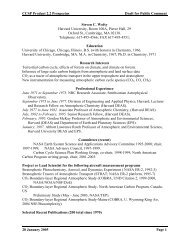Decision support experiments and evaluations using seasonal to ...
Decision support experiments and evaluations using seasonal to ...
Decision support experiments and evaluations using seasonal to ...
You also want an ePaper? Increase the reach of your titles
YUMPU automatically turns print PDFs into web optimized ePapers that Google loves.
Organizational measures <strong>to</strong> hasten, encourage,<br />
<strong>and</strong> sustain these knowledge-action systems<br />
must include practices that empower people <strong>to</strong><br />
use information through providing adequate<br />
training <strong>and</strong> outreach, as well as sufficient<br />
professional reward <strong>and</strong> development opportunities.<br />
Three measures are essential. First, organizations<br />
must provide incentives <strong>to</strong> produce<br />
boundary objects, such as decisions or products<br />
that reflect the input of different perspectives.<br />
Second, they must involve participation from<br />
ac<strong>to</strong>rs across boundaries. And finally, they<br />
must have lines of accountability <strong>to</strong> the various<br />
organizations spanned (Gus<strong>to</strong>n, 2001).<br />
Introspective <strong>evaluations</strong> of the organizations’<br />
ability <strong>to</strong> learn <strong>and</strong> adapt <strong>to</strong> the institutional <strong>and</strong><br />
knowledge-based changes around them should<br />
be combined with mechanisms for feedback<br />
<strong>and</strong> advice from clients, users, <strong>and</strong> community<br />
leaders. However, it is important that a review<br />
process not become an end in itself or be so<br />
burdensome as <strong>to</strong> affect the ability of the organization<br />
<strong>to</strong> function efficiently. This orientation<br />
is characterized by a mutual recognition<br />
on the part of scientists <strong>and</strong> decision makers<br />
of the importance of social learning—that is,<br />
learning by doing or by experiment, <strong>and</strong> refinement<br />
of forecast products in light of real-world<br />
experiences <strong>and</strong> previous mistakes or errors—<br />
both in forecasts <strong>and</strong> in their application. This<br />
learning environment also fosters an emphasis<br />
on adaptation <strong>and</strong> diffusion of innovation (i.e.,<br />
social learning, learning from past mistakes,<br />
long-term funding).<br />
4.3.4 The Value of User-<br />
Driven <strong>Decision</strong> Support<br />
Studies of what makes climate forecasts useful<br />
have identified a number of common characteristics<br />
in the process by which forecasts<br />
are generated, developed, <strong>and</strong> taught <strong>to</strong>—<strong>and</strong><br />
disseminated among—users (Cash <strong>and</strong> Buizer,<br />
2005). These characteristics (some previously<br />
described) include:<br />
• Ensuring that the problems forecasters address<br />
are driven by forecast users;<br />
• Making certain that knowledge-action<br />
systems (the process of interaction between<br />
scientists <strong>and</strong> users that produces forecasts)<br />
are end-<strong>to</strong>-end inclusive;<br />
• Employing “boundary organizations”<br />
(groups or other entities that bridge the<br />
<strong>Decision</strong>-Support Experiments <strong>and</strong> Evaluations <strong>using</strong> Seasonal <strong>to</strong><br />
Interannual Forecasts <strong>and</strong> Observational Data: A Focus on Water Resources<br />
•<br />
•<br />
communication void between experts <strong>and</strong><br />
users) <strong>to</strong> perform translation <strong>and</strong> mediation<br />
functions between the producers <strong>and</strong><br />
consumers of forecasts;<br />
Fostering a social learning environment<br />
between producers <strong>and</strong> users (i.e., emphasizing<br />
adaptation); <strong>and</strong><br />
Providing stable funding <strong>and</strong> other <strong>support</strong><br />
<strong>to</strong> keep networks of users <strong>and</strong> scientists<br />
working <strong>to</strong>gether.<br />
As noted earlier, “users” encompass a broad<br />
array of individuals <strong>and</strong> organizations, including<br />
farmers, water managers, <strong>and</strong> government<br />
agencies; while “producers” include scientists<br />
<strong>and</strong> engineers <strong>and</strong> those “with relevant expertise<br />
derived from practice” (Cash <strong>and</strong> Buizer,<br />
2005). Complicating matters is that some “users”<br />
may, over time, become “producers” as<br />
they translate, repackage, or analyze climate<br />
information for use by others.<br />
In effective user-driven information environments,<br />
the agendas of analysts, forecasters,<br />
<strong>and</strong> scientists who generate forecast information<br />
are at least partly set by the users of<br />
the information. Moreover, the collaborative<br />
process is grounded in appreciation for user<br />
perspectives regarding the decision context in<br />
which they work, the multiple stresses under<br />
which they labor, <strong>and</strong> their goals so users can<br />
integrate climate knowledge in<strong>to</strong> risk management.<br />
Most important, this user-driven outlook<br />
is reinforced by a systematic effort <strong>to</strong> link the<br />
generation of forecast information with needs<br />
of users through soliciting advice <strong>and</strong> input<br />
from the latter at every step in the generation<br />
of information process.<br />
Effective knowledge-action systems do not<br />
allow particular research or technology capabilities<br />
(e.g., ENSO forecasting) <strong>to</strong> drive the<br />
dialogue. Instead, effective systems ground<br />
the collaborative process of problem definition<br />
in user perspectives regarding the decision<br />
context, the multiple stresses bearing<br />
on user decisions, <strong>and</strong> ultimate goals that the<br />
knowledge-action system seeks <strong>to</strong> advance. For<br />
climate change information, this means shifting<br />
the focus <strong>to</strong>ward “the promotion of broad, userdriven<br />
risk-management objectives, rather than<br />
advancing the uptake of particular forecasting<br />
There is an emerging<br />
consensus that the<br />
utility of information<br />
intended <strong>to</strong> make<br />
possible sustainable<br />
environmental<br />
decisions depends<br />
on the “dynamics of<br />
the decision context<br />
<strong>and</strong> its broader<br />
social setting”.<br />
121




